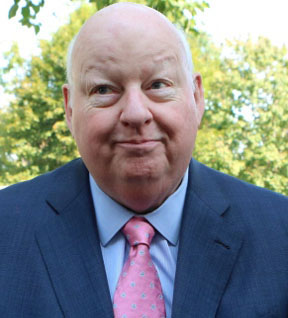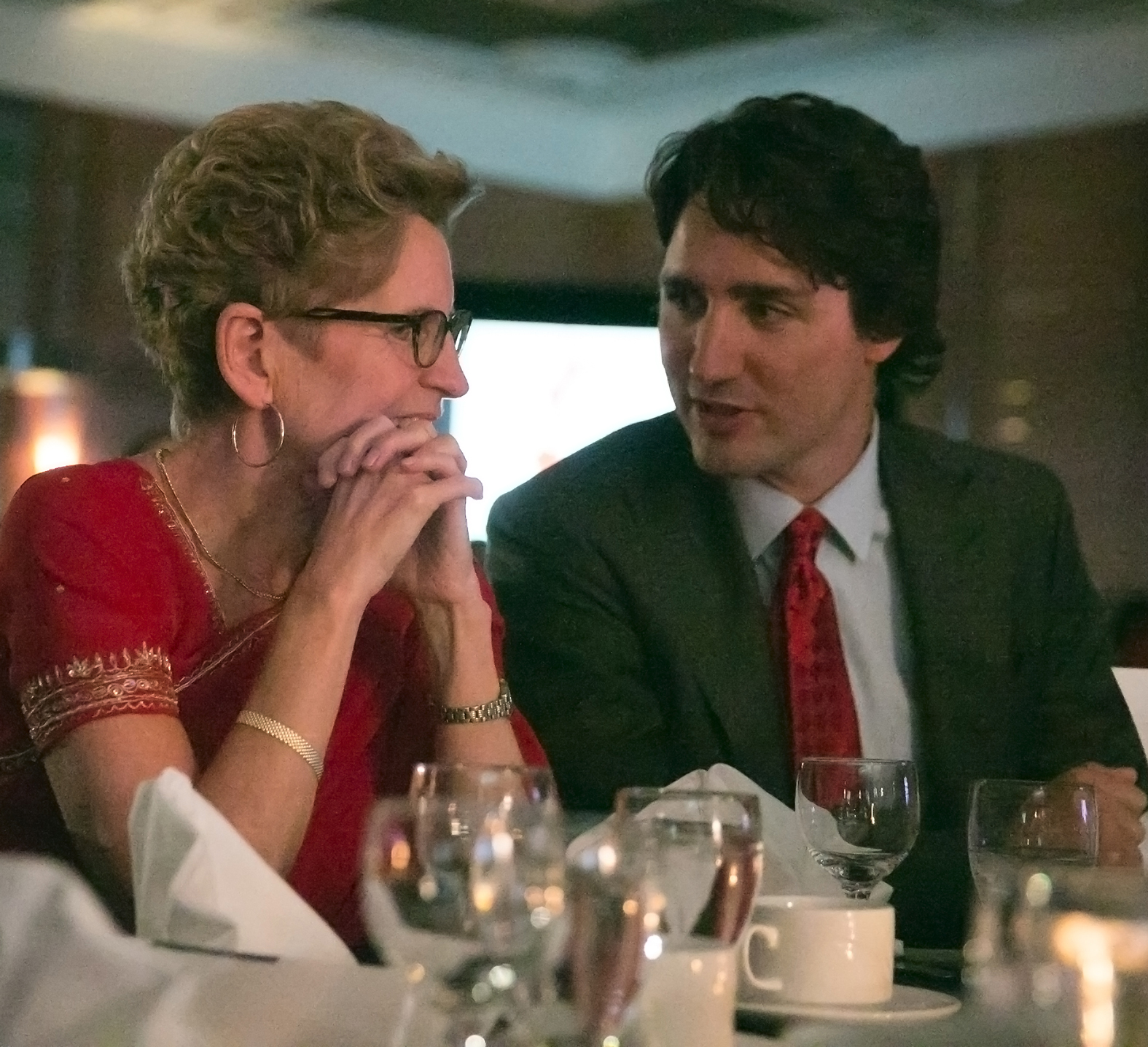Really 5 or 6 different Canadian regional elections on same day in 2015 (or Senate reform where are you?)
Aug 17th, 2015 | By Randall White | Category: Ottawa Scene
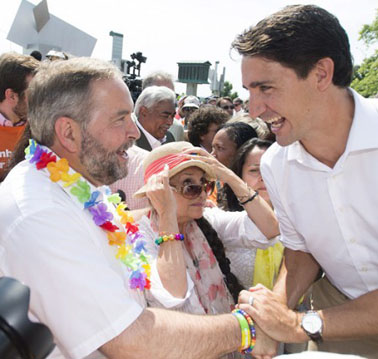
“Thomas Mulcair et Justin Trudeau se sont serré la main lors du défilé de la Fierté dimanche à Montréal. PHOTO PC.”
[UPDATED AUG 18TH]. The second week in the long official campaign for the Canadian federal election of 2015 is over. And the congenital regional diversity of it all is what sticks in my mind right now.
I’m watching from the old East Toronto, close to the most easterly of the Great Lakes. Reading “Liberal leader Justin Trudeau’s pie-in-the-sky platform,” by Murray Mandryk in the Regina Leader-Post, brings home what a different election it is on the Prairies.
Mr.Mandryk writes : “As Liberal leader Justin Trudeau took a leisurely stroll down Regina’s Scarth Street Mall, you got the distinct impression he could be anywhere … Alas, this may be the precise problem for Trudeau and his entire Liberal campaign. Canada is just not as generic as the Liberal leader would hope it to be.”
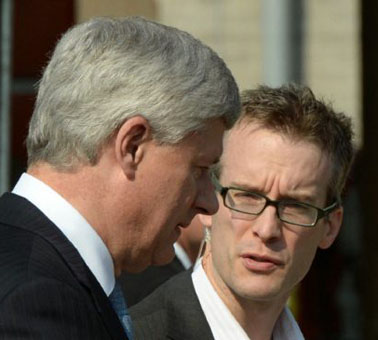
PM Harper chats with political strategist Ray Novak, a long-time staffer and confidant who has also cropped up in recent testimony at the Mike Duffy Senate expense trial. SEAN KILPATRICK / THE CANADIAN PRESS.
There is something to this argument, I think. I’m also not sure exactly what it means, and just how important it really is. But it is a problem with the Liberals that they don’t always connect with what’s down on the ground in this diverse country.
At the same time, Eric Grenier’s August 14 article on the CBC News site was called “Poll Tracker: Ontario behind tightening 3-way national race … The race gets tighter as polls show the Conservatives slipping and the Liberals improving slightly.”
The Liberals in the 20th century and beyond have always treated Canada as some generic thing that does not quite exist … yet. And that has also been one of their strengths. “National unity” or (more recently?) “a united Canada” has meant trying to live up to some ideal of the country that is not as regionally diverse and conflicted as Canada in 2015 still is in real life.
If and when you remove that still unrealized ideal, or even just take it out of the showroom window (the Liberal argument has been), what else have you got left? And so the ringing question Justin Trudeau’s father kept raising during the federal-provincial debates that finally led to the Constitution Act, 1982 was “Who will speak for Canada?”
Still, this 2015 election may finally go to the federal political leaders who do have a keener sense of parallel demands for regional accommodation. And there can be no doubt that what we are really going to have on October 19 is five or even six regional elections, not just one big election, driven by the same generic Canada-wide forces, from coast to coast to coast.
* * * *

Justin Trudeau promises to work closely with provincial premiers. Here he shares a laugh with BC premier Christy Clark during Vaisakhi celebrations late last summer – when the Liberals and not the New Democrats were still ahead on Canada’s Pacific coast.
So … using Mr.Grenier’s CBC Poll Tracker averages up to August 12 (as  reported today, on Monday, August 17, and supplemented intermittently with various individual poll results – and as (updated in parentheses in bold) for Mr. Grenier’s Poll Tracker update of “August 18, 2015, including polling in the field to August 17, 2015“ ) :
1.  BC NDP. If the election were just held in BC, on Canada’s Pacific coast, as of right now the Mulcair New Democrats would win 23 (20) out of 42 seats, for a slender (just shy of a) majority  government. (The Liberals would win 11 (9) seats, the Conservatives 7 (12), and the Greens 1 (1).)
2. Â ATLANTIC CANADA LIBERAL. If the election were just held in the four provinces of Atlantic Canada (NB, NL, NS, and PE), 19 (21) of the 32 seats in the region would give the Trudeau II Liberals a somewhat better than slender majority government. (Meanwhile, 7 (9) seats would go to the NDP, and 6 (2) to the Conservatives.)
3. Â CONSERVATIVE PRAIRIE PROVINCES. Some say PM Harper is worried about Alberta this time. But Grenier’s August 12 polling averages still give 27 (31) of the wild-rose province’s 34 federal seats to the Conservatives (with 4 (1) to the Liberals and 3 (2) to the NDP).
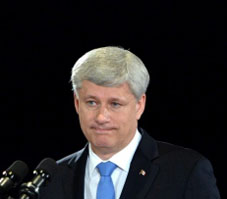
“Conservative leader Stephen Harper listens to a question from the media as he makes a campaign stop in Fredricton, New Brunswick on Monday, Aug. 17, 2015. (Sean Kilpatrick / THE CANADIAN PRESS).”
Right next door, the Poll Tracker has 19 (19) of the 28 seats in Saskatchewan and Manitoba together going Conservative, with 5 (5) to the Liberals and 4 (4) to the New Democrats. Or if the election were just held in the three Prairie provinces taken together, the Harper Conservatives would win a very solid majority government, with almost (more than) three-quarters (46) (50) of all the region’s 62 seats.
4. Â NEW NDP IN NEW QUEBEC ? It was the surprise victory of Rachel Notley’s provincial New Democrats in Alberta this past May that finally pushed the federal NDP into a surprise if still intermittent front-running status for this coming October 19. But it was Quebec in 2011 that remade the early 21st century NDP/NPD into a party that just might at last win a federal election, one way or another.

“Justin Trudeau (PLC), Thomas Mulcair (NPD), Gilles Duceppe (Bloc québécois) et Pierre Karl Péladeau (Parti québécois) ont participé mercredi au défilé de la Fête nationale.” Montreal, June 24, 2015. Photo: Jacques Nadeau Le Devoir.
The Grenier Poll Tracker’s August 12 polling averages for 2015 actually give the New Democrats 7 fewer Quebec seats than in 2011 (52 in a provincial total of 78 in 2015, compared with 59 of 75 seats in 2011 – and 59 of  78 in 2015, according to the August 17/18 Poll Tracker update). But that still means that the New Democrats would take almost two-thirds (three-quarters) of Quebec’s federal seats this year. (The Poll Tracker here also gives 16 (14) Quebec seats to the Liberals, 9  (5) to the Conservatives, and only one (0) to the Bloc Quebecois!)
5. Â WHAT’S GOING ON IN ONTARIO? The Grenier Poll Tracker’s recent August 12 polling averages for 2015 give 52 (52) of Ontario’s 121 federal seats to the Conservatives, 38 (38) to the Liberals, and 31 (31) to the New Democrats.
Other recent individual polls have suggested somewhat better Ontario numbers for the New Democrats. An EKOS poll covering August 5—11 reported the province-wide popular vote at 32% NDP, 31% Conservative, and 28% Liberal. A Forum Research poll covering August 10—11 put the Ontario popular vote at 33% NDP, 31% Conservative, and 31% Liberal. The most recent poll as I write, by Leger and covering August 10—12, shows the Ontario vote at NDP 31%, Liberal 31%, Conservative 30%. (And the very latest Abacus poll, covering August 14—17, reports Ontario numbers of 32% NDP, 30% Liberal, and 30% Conservative.)
Even if the Conservatives are as far ahead in the Ontario seat count as the August 12/(17) Poll Tracker suggests, they are currently running behind their record 73 Ontario seats in 2011. And that almost certainly makes it more challenging for Mr. Harper to win another majority government. (Though the good/bad news is that there are still nine weeks in which everything can change … )
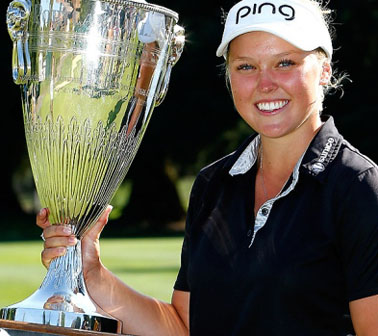
Teenager Brooke Henderson from Smiths Falls, Ontario “won the Portland Classic by eight strokes on Sunday for her first LPGA Tour victory. By virtue of the win, she climbed 15 spots to No. 17 in the Women's World Golf Rankings and will earn a tour card for 2016 because she's assured of finishing in the top 40 in earnings. (Jonathan Ferrey/Getty Image).”
At the moment, at any rate, the polls have also seemed more volatile in Ontario.
For the past short while at least recurrent surveys have more or less consistently shown NDP strength in BC, Liberal strength in Atlantic Canada, Conservative hegemony on the Prairies, and even what does now seem the serious enough persistence of the Jack Layton NDP reborn with the 2005 Sherbrooke Declaration, that so suddenly and surprisingly blossomed in Quebec in the 2011 federal election.
In the 2015 campaign so far, Ontario has been closer to a real three-way race. And that may persist for a while longer yet. In the most recent past Ontario itself has sometimes seemed a place vaguely adrift in various forms of regional confusion, inside and out.
6. Â THE TERRITORIES PLAY IT SAFE. The Grenier Poll Tracker’s August 12 polling averages suggest that Canada’s current three northern territories, taken together, are (quite understandably) Â going to play it safe in the year of living dangerously 2015. There are three seats, and the Poll Tracker at this particular moment, early in the morning of Monday, August 17, is saying that each of the three main parties will win one of the three seats.
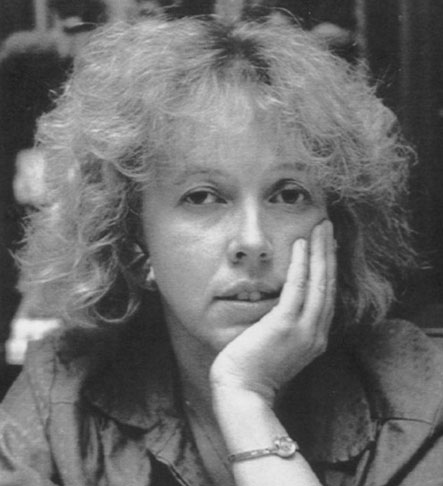
Elizabeth May in 1988, shortly after she resigned as senior policy advisor to federal Environment Minister Tom MacMillan, in Brian Mulroney’s Conservative government. Greg Teckles/Toronto Star.
So, no matter which party (or parties?) form(s) a government after October 19, at least the three northern territories taken together – the magnificent Canadian North to which even Stephen Harper has bowed in awe – will be well represented in Ottawa. (Alas the August 17 Poll Tracker update awards the August 12 Conservative seat to the Liberals for an update of 2 Liberal and 1 NDP members in the combined territorial delegation.)
* * * *
What happens when you put these particular regional results together, to form a single Canada-wide picture? The Grenier Poll Tracker’s August 12 popular vote averages (with August 17 updates in bold parentheses) apparently suggest this average calculation for seats in the new 338-member Canadian House of Commons :
Thomas (“Tom”) Mulcair’s New Democrats – 121 seats, 32.3% of Canada-wide vote (126 seats, 33.5%) ; Stephen Harper’s Conservatives – 120 seats, 29.3% of vote (121 seats, 29.4%) ; Justin Trudeau Liberals – 95 seats, 27.3% (90 seats, 26.7%) ; Elizabeth May’s Green Party – 1 seat, 5.7% (1 seat, 5.8%) ; Gilles Duceppe’s Bloc Quebecois – 1 seat, 4.6% (0 seats, 3.7%) ; Other – 0.9% (0.9%).

Thomas Mulcair (left) and Gilles Duceppe (right) at St. Jean Baptiste Day celebrations in Montreal this past June 24.
Who knows just where a crazy-quilt election result like this would lead, if anything like it finally did happen for real this coming Monday, October 19 (now more or less exactly nine weeks away, as I write if not as any esteemed and brilliant readers may be reading!)
Wherever this kind of result might lead, however, would be in a direction Canada has never quite ventured before. And maybe that is just what our times in the wider global village are calling for.
Whatever else, the 2015 Canadian federal election is a great opportunity. Here’s hoping enough of us take advantage of it. What Stephen Marche recently attacked as “The Closing of the Canadian Mind” in the New York Times seems a little too much like a prelude to the closing of Canada period. And this is becoming too interesting a place to give up on now.

Yes it’s still summer, but thanks to the marvels of technology you can still play hockey on artificial ice. Here “Halifax Mooseheads goalie Raphael Blais, centre, makes a save against the Cape Breton Screaming Eagles during their QMJHL pre-season hockey game at the Halifax Forum on Saturday.” (ADRIEN VECZAN / Hal Chron Herald.)
(Oh … and while we’re at it, we need to actually reform the Senate too – turn it into a proper elected democratic institution that helps deal effectively with what the first Canadian president of the American Economic Association, Harold Innis, called “the complex problems of regionalization in the recent development of Canada,” more than 70 years ago. That’s what the late summer circus at the Duffy trial is most urgently telling us. Of course some say bold things like Senate reform are impossible in Canada. But they have had their way for a while now, and look what’s happened. Maybe this time they will finally lose the election, one way or another! The Canadian Mind will be opened up again! And we can carry on with the journey to adulthood that some want to postpone forever.)
